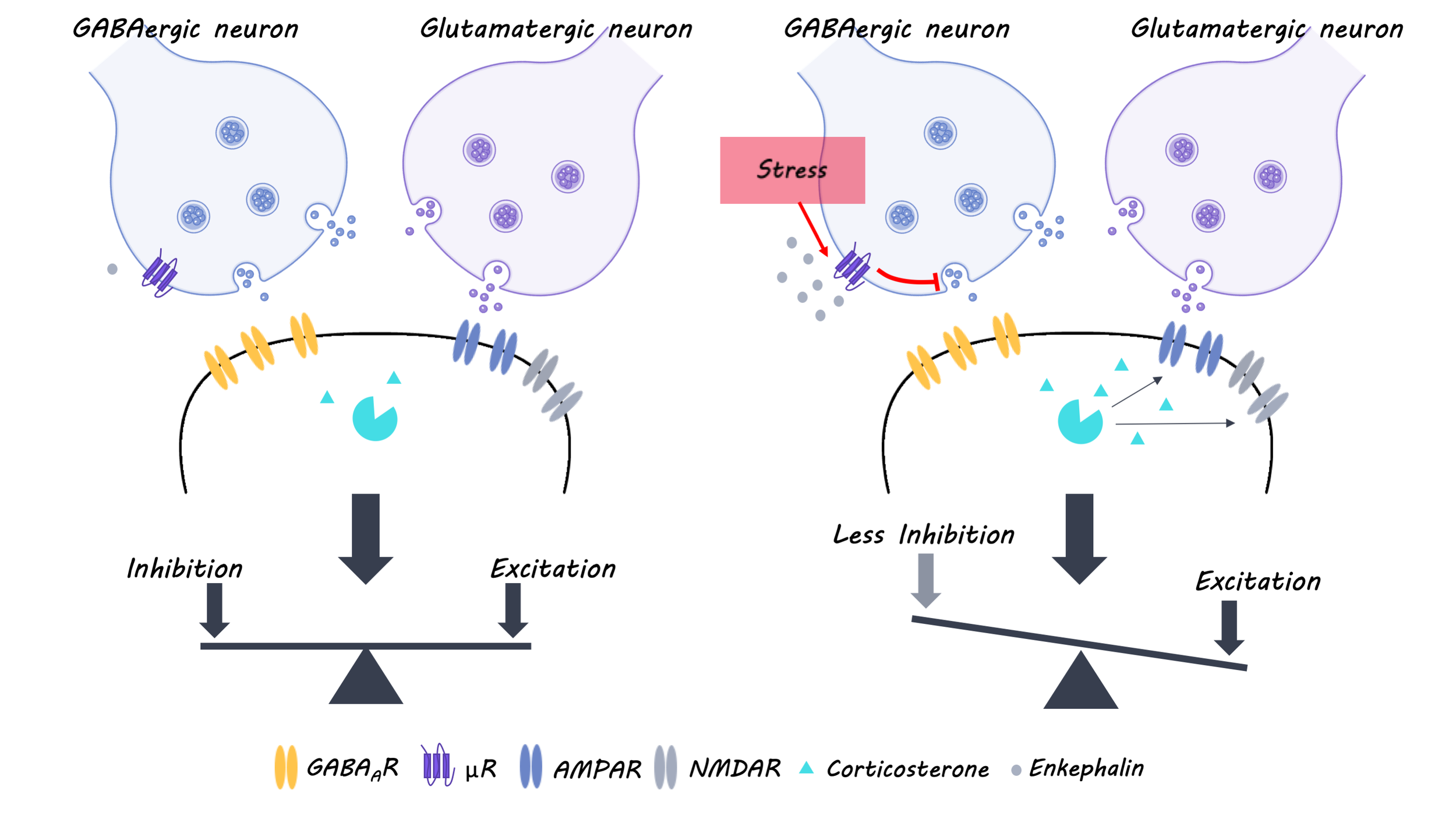Stress-Induced Memory Impairment is Mediated by Hippocampal Opioid Receptors
Post by Deborah Joye
What's the science?
Stress can impair your ability to retrieve memories. Perhaps you can recall a time that you sat down to take a big exam or started an important presentation only to have your mind go suddenly, frighteningly blank. We know that glucocorticoids (hormones activated by stress) can change excitatory synapses in the hippocampus and lead to impaired memory. But the effects of stress on memory go well beyond what can be explained just by the effects of glucocorticoids, suggesting that there may be other signals involved. In addition to glucocorticoids, stress also mobilizes endogenous opioids (i.e., made by your body) that can lead to cognitive, emotional, and physical effects that can help us adapt to stress. Opioids are often associated with pain relief, but how might they affect learning and memory in response to stress? This week in Molecular Psychiatry, Shi and colleagues use an impressive array of behavioral and cellular techniques to demonstrate that endogenous opioids produce stress-induced memory impairment by suppressing activity of GABAergic interneurons in the hippocampus.
How did they do it?
To produce stress, the authors placed mice on an elevated clear platform in a brightly lit room for close to an hour. Unstressed mice were in the same room but remained in their home cages. Throughout their experiments, the authors used the Morris Water Maze to test memory retrieval. In this task, mice are trained to swim in a circular pool and find a hidden platform which is consistently placed in the same region of the pool.
First, to determine if opioid receptors are involved with stress-induced memory impairment, the authors used naloxone, which strongly inhibits opioid receptors. Since there are three major opioid receptors in the hippocampus (µ, pronounced “mew”; δ, or delta; and κ, or kappa opioid receptors), the authors selectively activated or blocked specific opioid receptors to test which ones underlie stress-induced memory impairment. Next, the authors tested which endogenous opioid is involved by using antiserum to block the effects of opioids highly expressed in the hippocampus, β-endorphin and enkephalin, followed by memory retrieval testing. After testing which receptors and opioids are involved, the authors assessed which type of cells opioids might be acting on in stress-induced memory impairment. To do this, they used Cre-Lox recombination to delete the µ-opioid receptor gene in certain cell populations: GABAergic inhibitory interneurons, glutamatergic excitatory neurons, or astrocytes. Mice in the different µ-opioid receptor knockout conditions were then subjected to stress and the Morris water maze to test for memory impairment. To investigate possible changes in synaptic transmission, the authors recorded the electrophysiological activity of cells in the hippocampus immediately after stress. They also recorded electrophysiological changes in response to opioid receptor activation or inhibition. Finally, to test whether stress-induced memory impairments are due to inhibition of GABAergic interneurons, the authors activated or blocked GABA transmission in the hippocampus, then tested memory retrieval with the Morris water maze.
What did they find?
The authors found that µ-opioid receptor signaling is required for stress-induced impairment of memory retrieval. When µ-opioid receptor signaling is blocked, stressed mice do not exhibit memory impairments and activation of µ-opioid receptors in the hippocampus in unstressed mice reproduces memory impairment as if mice had been stressed. The authors also found that stress-induced memory impairment specifically depends on activation of µ-opioid receptors on GABAergic neurons, since stressed mice without µ-opioid receptors on GABAergic cells do not exhibit stress-induced memory impairments. Mice lacking µ-opioid receptors on glutamatergic cells or astrocytes still display stress-induced memory impairment. Using electrophysiology, the authors found that stress-induced activation of µ-opioid receptors on GABAergic interneurons decreases inhibitory synaptic transmission onto hippocampal CA1 neurons, resulting in memory impairment. Overall, the authors identified a new pathway in which acute stress mobilizes endogenous opioids to activate µ-opioid receptors on inhibitory GABA neurons in the hippocampus. This pathway reduces the release of GABA, increasing excitability of hippocampal cells and leading to impairments in memory retrieval.
What's the impact?
This study is the first to demonstrate that endogenous opioids play a role in stress-induced memory impairment. Specifically, this study examines and identifies the mechanism by which µ-opioid receptor activation on GABAergic cells within the hippocampus suppresses inhibition of hippocampal cells and results in memory retrieval impairments. These findings add an important new element to our understanding of how stress affects memory, and opens new avenues for research into the impacts of opioids in the hippocampus.
Shi et al., Hippocampal µ-opioid receptors on GABAergic neurons mediate stress-induced impairment of memory retrieval, Molecular Psychiatry (2019).Access the original scientific publication here.


